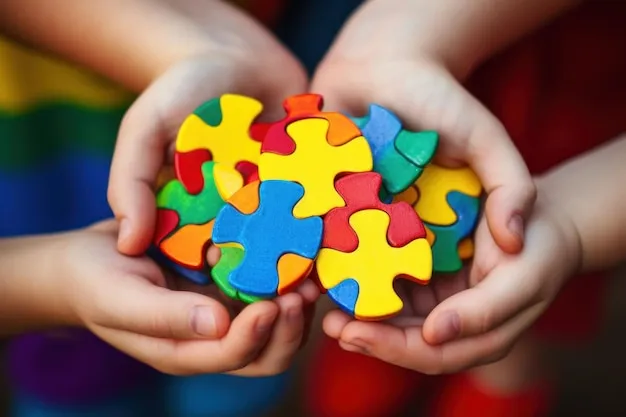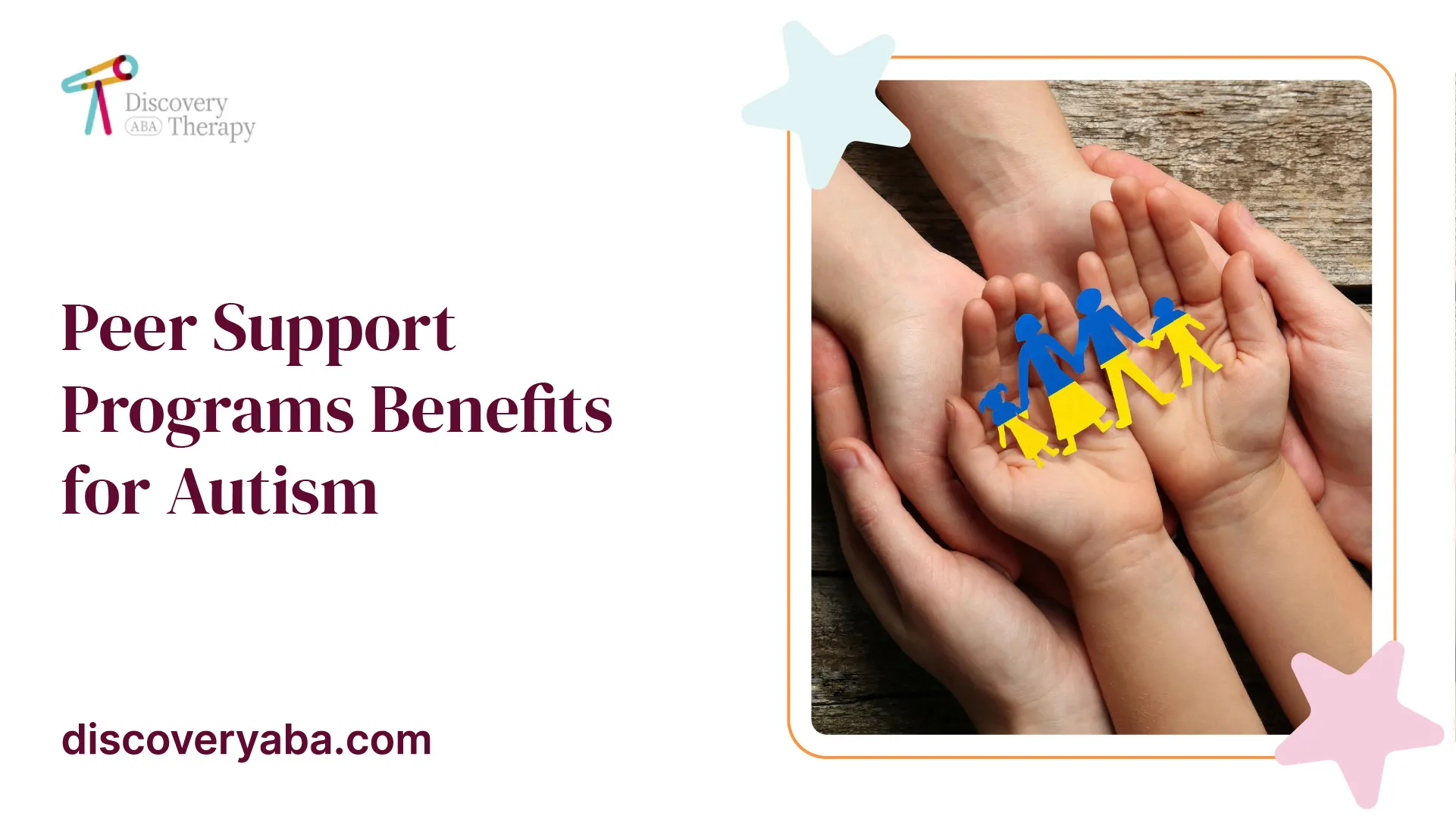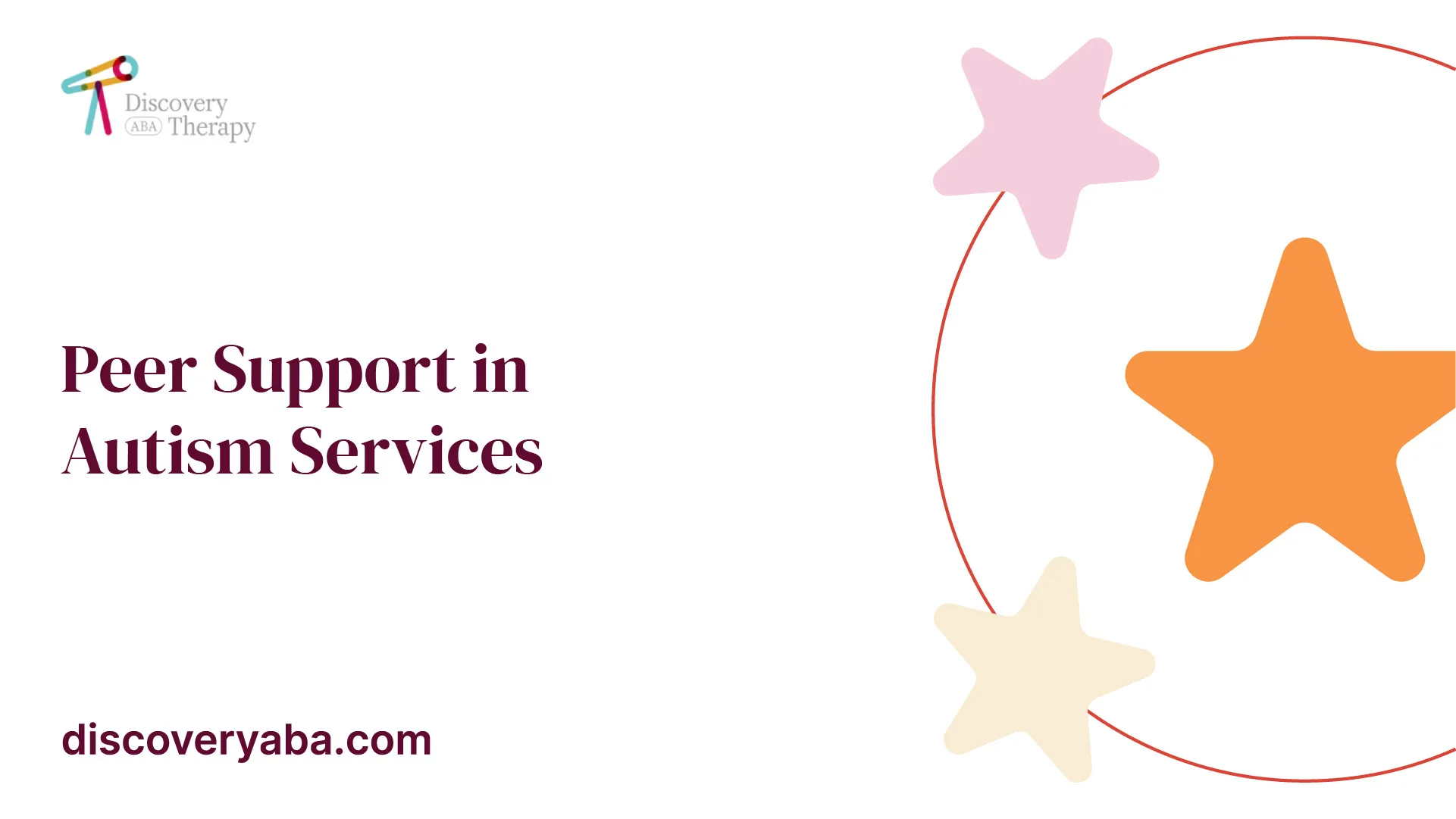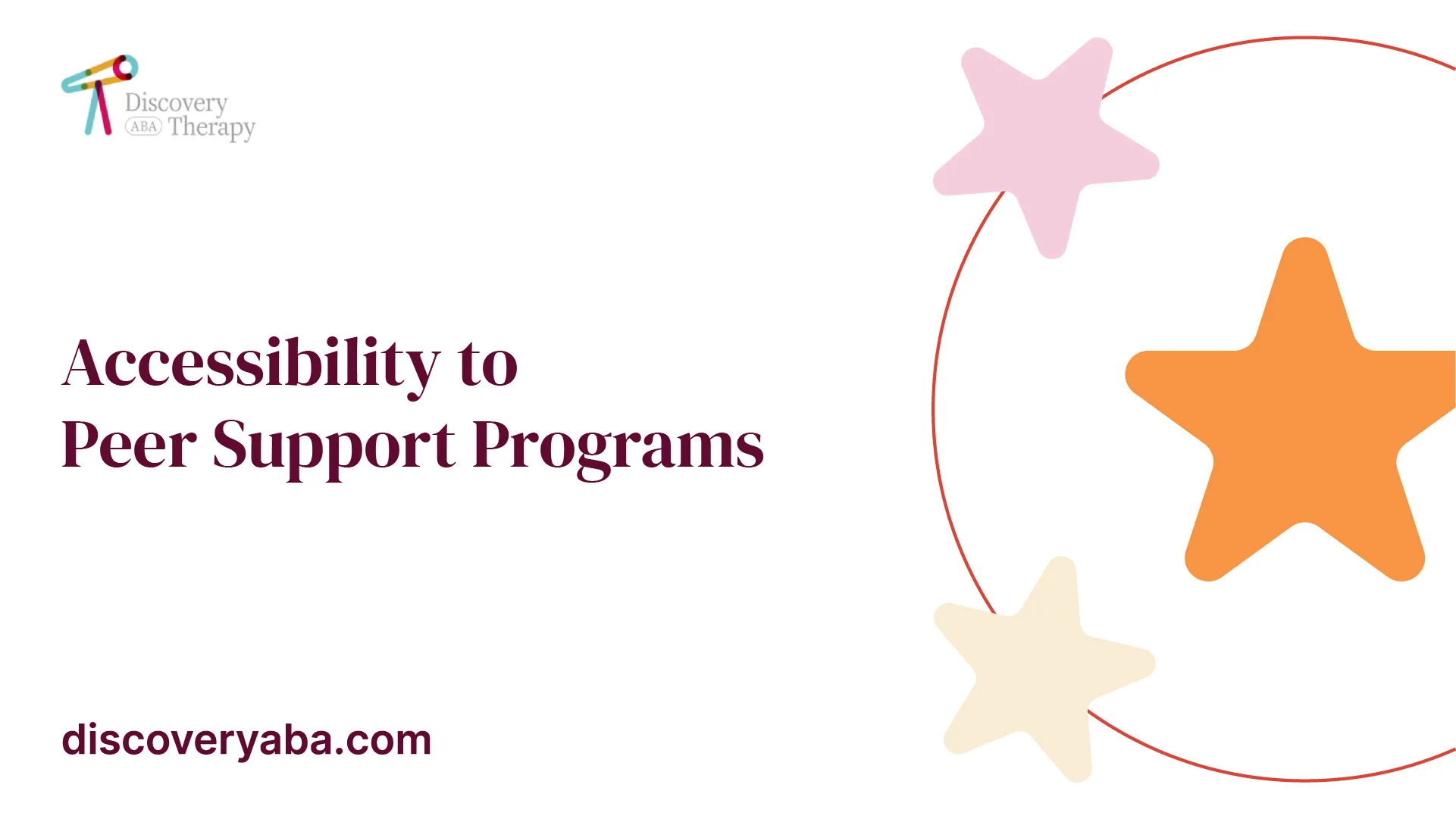Peer Support Programs Benefits for Autism
Discover peer support programs benefits for autism, enhancing social skills and fostering self-advocacy.

Benefits of Peer Support Programs
Engaging in peer support programs provides numerous advantages for individuals with autism spectrum disorder (ASD). These programs are particularly beneficial in enhancing socialization skills and fostering self-advocacy.

Enhancing Socialization Skills
Peer support programs play a significant role in improving social skills for children with ASD. Evidence indicates that participation in these programs leads to notable enhancements in social motivation, effective communication, and a reduction in undesirable behaviors [1].
Through peer-mediated interventions (PMI), individuals with autism are provided with opportunities to practice interactions in a supportive environment. This practice not only builds confidence but also encourages the development of meaningful relationships.
Benefits of Enhancing Socialization SkillsEffectsIncreased social motivationEnhances willingness to engage with peersReduction of undesirable behaviorsDecreases instances of social withdrawal and negative actionsImprovement in overall social communicationStrengthens ability to express thoughts and emotions
Engagement in structured peer activities fosters a sense of belonging and acceptance among children with ASD, helping them to navigate both school and community settings effectively [2].
Fostering Self-Advocacy
Self-advocacy is a critical skill for individuals with autism, empowering them to express their needs and preferences confidently. Peer support programs contribute significantly to the development of self-advocacy skills.
Through these initiatives, individuals learn to navigate child-serving agencies, make informed decisions, and manage their own challenges [3]. The emphasis on peer-led interactions allows participants to witness and emulate effective self-advocacy strategies demonstrated by their peers.
Benefits of Fostering Self-AdvocacyEffectsImproved self-managementEnhances ability to handle personal situations independentlyGreater understanding of rights and resourcesPromotes informed decision-makingIncreased confidence in social situationsEncourages active participation in various settings
Ultimately, peer support programs not only assist in social skills development but also equip individuals with autism with vital self-advocacy tools necessary for their personal growth and success. For more on how to prepare individuals with autism for transitions, consider visiting our article on preparing for a new school year with autism and exploring technology-assisted interventions in autism.

Peer Support in Autism Services
In the realm of autism services, peer support plays a significant role in enhancing the lives of individuals on the spectrum. It fosters not only social connections but also provides access to crucial resources and skills necessary for navigating their unique challenges.
Role of Peer Specialists
Peer specialists are essential components of autism services, offering support that is both relatable and effective. They assist individuals with autism in engaging supports, improving self-management, and decision-making while navigating child-serving agencies [3]. Their shared experiences with autism create a unique bond that enhances trust and encourages open communication.
Training peer specialists is vital to the success of these programs, as they need the right skills and knowledge to effectively assist their peers. Research shows that properly trained peer helpers can significantly improve health outcomes and adherence to treatment, maximizing the effectiveness of peer support initiatives. This training includes understanding social cues, communication strategies, and techniques to foster independence and self-advocacy among peers.
Promoting Natural Supports
Peer support programs are designed to promote natural supports within the community. These initiatives focus on fostering independence among individuals with autism while addressing their diverse needs. Autistic-driven support programs help provide tools that enhance the quality of life for autistic youth and adults.
The emphasis on natural supports means encouraging relationships outside of formal settings, enhancing social participation, and improving community connections. Autistic individuals often benefit more from interactions with their peers, as studies have shown that autistic individuals engage better with others on the spectrum. They commonly exhibit fewer stigmatizing beliefs toward autism, which fosters closer bonds and empathy, enhancing socialization opportunities [4].
Overall, peer support in autism services encapsulates a multifaceted approach that aims to address the individual needs of those on the spectrum while fostering a supportive environment for growth and development. Emphasizing independent living initiatives not only aligns with the neurodiversity movement but also facilitates a meaningful life for autistic individuals, allowing them to thrive in their communities.
For families interested in how to prepare for transitions and services, check our guide on preparing for a new school year with autism and explore technology-assisted interventions in autism for additional resources.

Accessibility to Peer Support Programs
Understanding the availability and accessibility of peer support programs is crucial for families and caregivers of individuals with autism. In Alabama, several initiatives are in place to ensure that these support services are accessible and beneficial.
Initiatives by Alabama Department of Mental Health
The Alabama Department of Mental Health plays a vital role in providing services for children and youth with Autism Spectrum Disorder (ASD). One of their key programs is the Intensive Home-Based Services (IHBS) which encompasses peer support as part of a comprehensive approach. Alongside peer support, the IHBS includes various interventions such as Therapeutic Mentoring, Behavioral Support, and In-Home Therapy. This multi-faceted support aims to assist families in navigating challenges associated with autism, such as socialization and self-advocacy, while offering tailored services that accommodate the unique needs of each individual.
Services OfferedDescriptionIntensive Home-Based ServicesComprehensive support including peer support, behavioral strategies, and in-home interventions.Therapeutic MentoringOne-on-one mentoring focused on skill development and personal growth.Behavioral SupportStrategies to manage and improve behavioral challenges.
By accessing these services, families can benefit from enhanced support and guidance, making it easier to navigate child-serving agencies and improve self-management skills.
Regional Autism Network (RAN) in Alabama
The Regional Autism Network (RAN) is another significant initiative that provides vital resources for individuals with autism. Supported by the Alabama Interagency Autism Coordinating Council (AIACC), RAN offers various services such as professional training programs, technical assistance, and consultation services. These services are designed to aid families and caregivers in understanding autism better and accessing relevant support networks.
RAN ServicesDescriptionProfessional Training ProgramsTraining for professionals working with individuals with autism to ensure best practices.Technical AssistanceSupport and guidance for implementing autism-specific strategies in various settings.Public Education ProgramsInitiatives aimed at raising awareness and fostering community understanding of autism.
Through these programs, families are empowered with the knowledge and tools to effectively support their loved ones and advocate for their needs. These initiatives contribute significantly to the peer support programs benefits for autism by fostering a collaborative environment where families can connect and share experiences. For more information on how to prepare for challenging situations, such as preparing for a new school year with autism, families can access tailored resources that align with their specific needs.
By leveraging these accessibility initiatives, families and caregivers can enhance their understanding and use of peer support resources, thereby improving the overall well-being of individuals with autism in Alabama.
Participation Trends in Support Groups
As families and caregivers navigate the complexities of autism, peer support programs play a significant role in providing assistance. Understanding participation trends can reveal how these programs benefit families of children with autism.
Impact on Families of Children with Autism
A significant number of families have engaged in autism-specific support groups. Research indicates that two-thirds of families of children with autism have participated in such groups, with over half currently involved. These families often perceive tangible benefits from these programs in managing the challenges associated with caring for a child with autism. Support groups offer a platform for sharing experiences, advice, and resources, which can empower families to feel less isolated.
The following table summarizes the perceived benefits reported by families engaged in peer support programs:
Benefit CategoryPercentage of Families Reporting BenefitEmotional Support75%Increased Knowledge about Autism68%Community Connection60%Strategies for Managing Challenging Behaviors65%
Demographic Patterns in Participation
Demographic factors significantly influence participation in autism support groups. Participants are more commonly middle-income, well-educated, and predominantly white, often residing in suburban areas. Notably, parents of children exhibiting self-injurious behaviors, sleep problems, or severe language deficits are more inclined to participate in these support programs. This suggests that the severity of certain symptoms may drive families to seek out peer support networks.
Conversely, families from lower socioeconomic backgrounds and African American families tend to underutilize support groups, indicating a gap in access and participation that must be addressed [5]. This trend highlights the critical role clinicians play as referral sources for these groups, as healthcare professionals can help guide families to essential resources and support.
Understanding these participation trends can inform the development of more inclusive and effective peer support programs for all families affected by autism. For additional strategies on supporting families during challenging times, see our article on preparing for a new school year with autism and explore technology-assisted interventions in autism.
Effectiveness of Peer Support Programs
Peer support programs have shown significant benefits for individuals with autism, particularly in improving social skills and addressing social isolation. These programs provide a structured environment where participants can learn from and interact with peers, ultimately contributing to their overall development.
Improving Social Skills
Participation in peer support programs has proven effective in enhancing social skills for children with autism spectrum disorder (ASD). Research highlights that peer-mediated intervention (PMI) leads to notable improvements in social motivation, a reduction in undesirable behavior patterns, and an overall enhancement in social communication abilities [1].
The effectiveness of PMI is further evidenced by the significant decrease in social communication scores among participants compared to control groups, demonstrating marked improvements in their ability to engage and communicate with others [1].
BenefitPMI Group ImprovementControl Group ChangeSocial MotivationIncreasedNo significant changeReduction in Undesirable BehaviorsNotable decreaseMinimal changeEnhancement in Social SkillsSignificantLimited improvement
Addressing Social Isolation
Social isolation is a common challenge for individuals with ASD, which can be alleviated through peer support programs. PMI therapy equips children to navigate social scenarios by fostering interactions with typically developing peers. These relationships assist in creating a more inclusive environment and provide the necessary support for children to actively participate in social interactions [6].
Research shows that PMI is more effective at integrating children with ASD into social settings, compared to traditional behavioral therapies. By encouraging social engagement and facilitating communication skills, peer support programs play a crucial role in reducing feelings of isolation among children with autism.
The following table summarizes the outcomes observed in participants engaged in PMI programs:
OutcomeImprovement AchievedIntegration into School SettingsHighEffective ParticipationEnhancedReduction in Social IsolationSignificant
By focusing on these two critical areas, peer support programs demonstrate remarkable effectiveness in promoting the social development and emotional well-being of children with autism. For more insights into preparing for changes in school environments, consider reviewing our article on preparing for a new school year with autism. Additionally, exploring technology-assisted interventions in autism can provide further resources to support these efforts.
Implementing Evidence-Based Practices
In order to maximize the effectiveness of peer support programs and enhance the benefits for individuals with Autism Spectrum Disorder (ASD), it is essential to implement evidence-based practices (EBPs). These strategies are proven to be effective through experimental research studies or large-scale field studies.
Strategies for Improved Outcomes
To ensure positive outcomes for children with ASD, several key strategies should be employed. These strategies consist of precise planning and assessment, including:
High-leverage practices (HLPs), such as small-group instruction, functional behavior assessments, and peer-assisted strategies, have been shown to enhance student performance for those with ASD. The overlap between HLPs and EBPs indicates that practices like Peer-Mediated Interventions (PMIs) can be particularly beneficial. Research indicates that PMIs can increase social motivation, minimize undesired behavior patterns, and improve overall social skills for children with mild to moderate ASD.
StrategyDescriptionTarget BehaviorIdentify specific behaviors to improveBaseline Data CollectionGather initial data for accurate comparisonsGoal SettingEstablish specific measurable goalsSelection of EBPsChoose effective practices based on researchEffectiveness EvaluationMonitor progress and adjust strategies as necessary
Compliance with Educational Mandates
Educators are required by the Every Student Succeeds Act (ESSA) and the Individuals with Disabilities Education Act (IDEA '04) to employ evidence-based academic and behavioral practices to the greatest extent possible. This mandates that all interventions must be demonstrably effective in enhancing behaviors and skills while reducing inappropriate behaviors for children with ASD.
Compliance with these educational mandates not only ensures adherence to legal requirements but also solidifies the foundation for effective support systems in place. For instance, the implementation of EBPs requires proper training and preparation, which can significantly impact the effective delivery of services.
By leveraging EBPs alongside mandated regulations, families and caregivers can expect improved support structures for individuals with ASD, ultimately leading to better development and inclusion outcomes. For further assistance, families can refer to resources on preparing for a new school year with autism or explore technology-assisted interventions in autism.
References
[2]:
[3]:
[4]:
[5]:
[6]:
[7]:
Does Your Child Have An Autism Diagnosis?
Learn More About How ABA Therapy Can Help
Find More Articles
Contact us
North Carolina, Nevada, Utah, Virginia
New Hampshire, Maine
Arizona, Colorado, Georgia, New Mexico, Oklahoma, Texas
.avif)




































































































